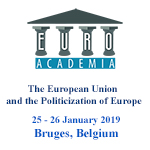Euroacademia Conferences
 Europe Inside-Out: Europe and Europeanness Exposed to Plural Observers (9th Edition) April 24 - 25, 2020
Europe Inside-Out: Europe and Europeanness Exposed to Plural Observers (9th Edition) April 24 - 25, 2020 Identities and Identifications: Politicized Uses of Collective Identities (9th Edition) June 12 - 13, 2020
Identities and Identifications: Politicized Uses of Collective Identities (9th Edition) June 12 - 13, 2020 8th Forum of Critical Studies: Asking Big Questions Again January 24 - 25, 2020
8th Forum of Critical Studies: Asking Big Questions Again January 24 - 25, 2020 Re-Inventing Eastern Europe (7th Edition) December 13 - 14, 2019
Re-Inventing Eastern Europe (7th Edition) December 13 - 14, 2019 The European Union and the Politicization of Europe (8th Edition) October 25 - 26, 2019
The European Union and the Politicization of Europe (8th Edition) October 25 - 26, 2019 Identities and Identifications: Politicized Uses of Collective Identities (8th Edition) June 28 - 29, 2019
Identities and Identifications: Politicized Uses of Collective Identities (8th Edition) June 28 - 29, 2019 The European Union and the Politicization of Europe (7th Edition) January 25 - 26, 2019
The European Union and the Politicization of Europe (7th Edition) January 25 - 26, 2019 7th Forum of Critical Studies: Asking Big Questions Again November 23 - 24, 2018
7th Forum of Critical Studies: Asking Big Questions Again November 23 - 24, 2018 Europe Inside-Out: Europe and Europeanness Exposed to Plural Observers (8th Edition) September 28 - 30, 2018
Europe Inside-Out: Europe and Europeanness Exposed to Plural Observers (8th Edition) September 28 - 30, 2018 Identities and Identifications: Politicized Uses of Collective Identities (7th Edition) June 14 - 15, 2018
Identities and Identifications: Politicized Uses of Collective Identities (7th Edition) June 14 - 15, 2018
Politicization of Europe without the Peoples of Europe?
-
-

-
Presentation speakers
- Carles José i Mestre, Department of Philosophy, University of Barcelona, Spain
Abstract:
Many of the most relevant Treaties regarding European Union include explicit references to the “peoples of Europe” (cf. Preamble to the Treaty of Rome, for instance, or Preambles to Maastricht and Lisbon Treaties), even as entities not reducible to Member States, as in the Solemn Declaration on EU (1983), where the ten heads of state and government confirmed there “their commitment to progress towards an ever closer union among the peoples and Member States of the European Community”). These mentions of the “peoples” of Europe can be seen as just another way of referring to the different sets of citizens, but we will defend that this persistence in the use of the word is related to recognizing that the political construction of Europe can’t neglect Community factors and that, in any case, that construction will not succeed if these factors are neglected. In order to do so, first of all we need to show that European communities or peoples do indeed exist (as specifically different from the sets of citizens regarding European states), and evidence will be provided in this regard. Then we will show how Community factors have been neglected in the political construction of Europe up to this point (especially regarding democratic procedures), and the probable effects of that negligence with regard to the “disenchantment” of many citizens of member states within the European Union. Finally, as a theoretical duty fulfilment, some attempts to respond to this (unsatisfactory) general situation will be offered, paying special attention to the concrete question of who has to decide and how in this political construction of Europe.
-
Related Presentations

Optimism in a Contested Region – Forecasting the Future of the European Union and Armenia
- Justin Tomczyk

Visual Identity and the Human Crisis in Errementari: The Blacksmith and the Devil
- Adriano Messias De Oliveira

“Visability”. Visual Research on Abilities During the Jubilee of Mercy
- Francesca Guarino













